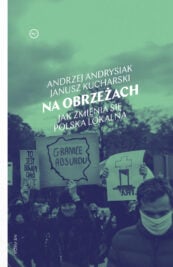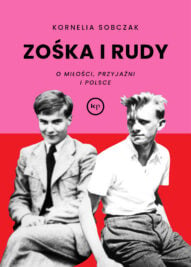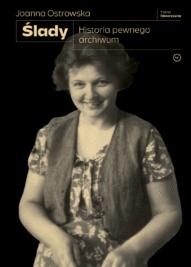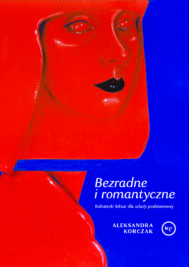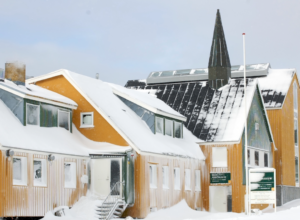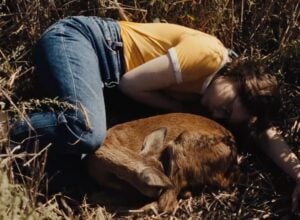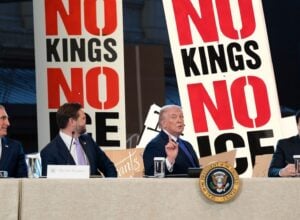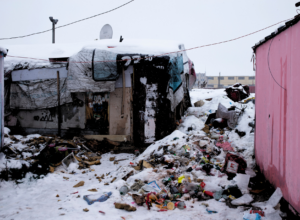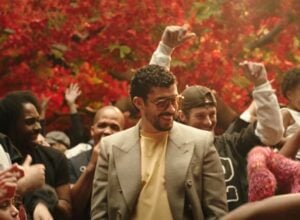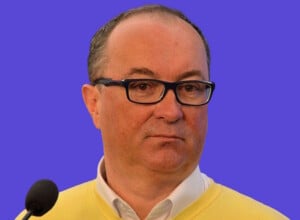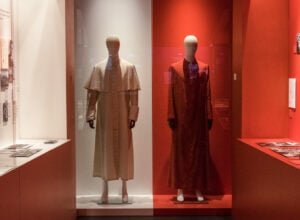„Chciałabym opowiedzieć wam historię.
Pewnego razu w Somalii żyła sobie mała dziewczynka, która bardzo lubiła chodzić do szkoły i bardzo lubiła się uczyć. Marzyła, że pewnego dnia zostanie lekarką. Że coś osiągnie. Ale na jej drodze stanęli źli ludzie – terroryści z Al-Shabab. Terroryści nie chcieli, aby dziewczynki się uczyły. Uważali, że miejsce kobiety jest w kuchni. Ale ta dziewczynka nie chciała się podporządkować. Jej opór ściągnął na nią mnóstwo niebezpieczeństw, takich jak zmuszanie do małżeństwa czy okaleczenie narządów płciowych. Musiała więc uciekać.
Ta dziewczynka – to ja. Nazywam się Sainab, mam 17 lat i chcę wam opowiedzieć o tym, co spotkało mnie na granicy polsko-białoruskiej”.
Tak mówiła Sainab na konferencji prasowej w Warszawie zorganizowanej w październiku przez Grupę Granica.
Bartosz Rumieńczyk: Miałaś 16 lat, gdy zdecydowałaś się wyjechać z Somalii.
Sainab: Zgadza się, choć tak naprawdę tę decyzję podjął mój ojciec.
Wbrew twojej woli?
Nie, nie. Ja też chciałam stamtąd wyjechać. Chciałam ratować swoje życie, więc nie protestowałam.
Najpierw poleciałaś do Rosji. Wiedziałaś, co cię czeka?
Wylatując z Somalii, myślałam, że dotrę do miejsca, gdzie będę bezpieczna i gdzie będę mogła spełniać swoje marzenia. Nie wiedziałam, że trafię do lasu, między granicami dwóch państw, gdzie będą na mnie czyhać rozmaite niebezpieczeństwa.
Nie sprawdziłaś w internecie, co dzieje się na granicy polsko-białoruskiej?
W Somalii uczyłam się w szkole z internatem i nie miałam swobodnego dostępu do internetu, ale prawda jest taka, że nigdy nie interesowałam się tym, co dzieje się na szlakach migracyjnych. Byłam skupiona na nauce i nie myślałam, że któregoś dnia zostanę uchodźczynią czy migrantką. Nie wiedziałam więc, co dzieje się na granicy polsko-białoruskiej, tak samo, jak nie wiedziałam, co dzieje się z migrantami czy uchodźcami w Libii lub Turcji.
Czyli myślałaś, że lecisz do bezpiecznego miejsca. A dokąd dotarłaś?
Do Moskwy. Przemytnik zajął się wszystkim i jeszcze tego samego dnia pojechałam do Białorusi.
Czułaś się z nim bezpiecznie?
O, nie, nie. To nie był nikt znajomy ani nikt z rodziny. Od wylotu z Somalii nie czułam się bezpiecznie. Powiedziałam sobie jednak, że muszę dotrzeć tam, gdzie będzie bezpiecznie.
Jak wyglądała sytuacja na granicy polsko-białoruskiej?
Przerażająco. Pierwsze, co przyszło mi do głowy, to że stanie mi się tu coś złego, że nie dam rady, że po prostu zginę.
Zobaczyłam tych wszystkich ludzi – z Syrii, Afganistanu, Jemenu, Etiopii, Somalii. Na każdej twarzy malowało się inne cierpienie, każda twarz opowiadała inną historię, bo każdy miał inne powody, by musieć opuścić swój dom i dotrzeć do tego strasznego miejsca.
Niektórzy tkwili tam miesiącami, bez dostępu do świeżej wody czy porządnego jedzenia, wielu z nich było po pushbackach, wielu było pobitych przez żołnierzy. Były tam rodziny z dziećmi, matki z niemowlakami na rękach. Byli też starzy, schorowani, byli mężczyźni zwijający się z bólu żołądka, poranieni i z różnymi innymi dolegliwościami.
Jak zachowywały się służby białoruskie?
Na szczęście ich nie spotkałam. Białoruskiej strony granicy nie da się przekroczyć tak jak polskiej, czyli przejść przez płot, bo ich płot ma czujniki i gdy tylko się go dotknie, alarm wzywa służby. Aby przejść niezauważonym, trzeba zrobić podkop.
Ile czasu spędziłaś w sistiemie, czyli między granicami?
Nie powiem ci, bo po prostu nie pamiętam. Pamiętam tylko, że z Somalii wyjechałam 15 marca, a 11 czerwca dotarłam do Niemiec.
Jakie zagrożenia czyhają na kobiety na granicy? I jak kobiety mogą się bronić?
Kobietom jest szczególnie trudno. Na granicy po białoruskiej stronie jest dużo przemocy, może też dochodzić do gwałtów. Na szczęście ja sama tego nie doświadczyłam ani nie byłam świadkinią takich zdarzeń.
Jak się bronić? Nie da się bronić. Jak polskie wojsko cię dopadnie, to może z tobą zrobić, co zechce. Ja miałam to szczęście, że nigdy nie wpadłam w ich ręce. Widziałam natomiast na własne oczy, co żołnierze robią ludziom.
Co na przykład?
Widziałam, jak polewają gazem pieprzowym twarze ludzi, którzy stoją przy płocie i proszą o wodę, jedzenie czy pomoc. Widziałam też, jak przepychają ludzi przez te małe drzwi w płocie, wiesz przez które?
Tak, nazywają je cynicznie oknami życia.
Wybór tego okna często zależy od numeru słupka granicznego, przy którym osoba została zatrzymana. Jeśli zatrzymają osobę przy słupku np. z numerem 350, to wyrzucą go przy słupku z numerem 650, czy 950, tak aby nie wiedział, gdzie został wyrzucony, aby nie odnalazł swojej rodziny czy przyjaciół.
A jak wyglądają same pushbacki?
Widziałam, jak wyrzucali jednego chłopaka. Przed płotem pobili go, skopali, dociskali butami do ziemi. Polskie wojsko stosuje przemoc cały czas, i to wobec każdego. Płeć nie chroni przed przemocą, może się wydawać, że wojsko bije tylko młodych mężczyzn, ale to nieprawda. Biją także kobiety i nastoletnie dziewczynki. Przed pushbackiem zabierają wszystko, co ludzie mają – telefony, jedzenie, ciepłe kurtki.
Słyszałem historie, że wojsko niszczy ludziom pieniądze.
Nie tyle niszczy, ile przede wszystkim kradnie. Zabierają wszystko, aby ludzie nie próbowali przekraczać granicy kolejny raz.
A czy można z granicy zawrócić np. do Mińska czy do Moskwy?
Według mnie to niemożliwe.
Jak więc przetrwać na granicy?
Tak naprawdę dopiero w lesie orientujesz się w całej sytuacji, więc ciężko się do tego jakkolwiek przygotować. Trudno też na kimkolwiek polegać. Nie możesz oczekiwać, że ktoś będzie na ciebie czekał, jak już przekroczysz granicę. Możesz liczyć tylko na siebie.
Jak wyglądało przekroczenie granicy z Polską?
Na płot od strony białoruskiej wdrapałam się po drabinie, na szczycie pokaleczyłam dłonie o concertinę, a następnie zsunęłam się po jednym z tych pionowych szczebli, 5 metrów w dół, jak strażak jadący na akcję. Wiedziałam, że w lesie są żołnierze i straż graniczna, którzy tylko czekają, aby mnie dopaść i wyrzucić z powrotem, więc jak tylko postawiłam stopę po polskiej stronie, zaczęłam pędzić przed siebie. To było bardzo trudne, bo wiele dni nie jadłam nic porządnego i nie piłam czystej wody, musiałam też uważać, aby nie upaść i nie zrobić sobie jakiejś krzywdy, np. skręcić kostki. Jak wtedy miałabym uciekać?
Bałaś się?
Okropnie, ale wiesz co? Na granicy odkryłam, że jestem bardzo silną kobietą. Zamiast się załamywać i płakać, zaczęłam szukać rozwiązań. Okej, jestem sama w lesie, co mogę zrobić, aby przetrwać? Dziś wiem, że ze wszystkim poradzę sobie sama. Ufam sobie i wierzę w siebie.
A jednak w pewnym momencie musiałaś zwrócić się po pomoc i wsparcie.
Brnęłam przez ten las sama, powtarzając sobie – Sainab, musisz iść dalej, musisz dać radę. Cały czas rozglądałam się, czy ktoś mnie nie śledzi, czy ktoś mnie nie goni. Było mi bardzo trudno, bo nie szłam prostą drogą, ale na przełaj. Ziemia była jak pofalowana, co chwila potykałam się o zwalone drzewa, wpadałam w jamy, grzęzłam w błocie. Mimo że był to środek dnia, to szum drzew i trzask gałęzi brzmiał bardzo złowrogo.
W takich sytuacjach wyobraźnia pracuje na pełnych obrotach. Zwykłe bzyczenie komara może doprowadzić do paniki. W końcu utknęłam na bagnach. Z początku myślałam, że to tylko jedna wielka kałuża, ale bagna zaczęły mnie otaczać, więc przycupnęłam przy drzewie, jak na wysepce i wtedy powiedziałam sobie – Sainab, bądź dla siebie dobra i poproś o pomoc.
Pracowniczki humanitarne, które do ciebie dotarły, opowiadały mi, że wyruszyły nad ranem, o wschodzie słońca i szły do ciebie co najmniej sześć godzin. Mówiły mi też, że same tonęły w bagnach po pas i że musiały się nawzajem wyciągać. Dziewczyny pracują na granicy od lat, ale takiego bagna jeszcze nie widziały.
Gdy już do mnie dotarły, obiecały, że mnie tak nie zostawią, bo to zbyt niebezpieczne miejsce.
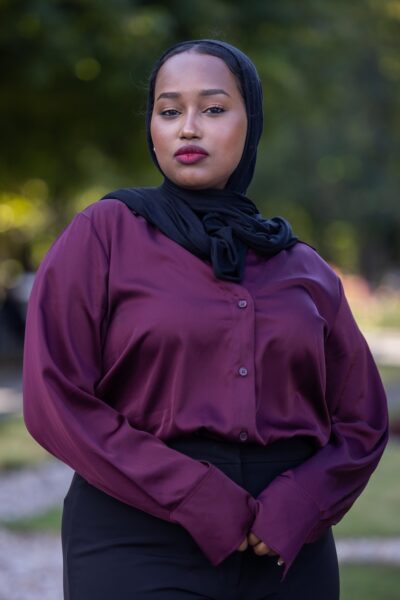
Dziewczyny opowiadały mi też, że były pod wrażeniem twojego humoru. Gdy wychodząc z tego bagna, zapadłaś się po pas, zamiast Oh my God wypaliłaś Oh my mud…
Podobało im się też, jak dopingowałam się w drodze, mówiąc „dawaj, Sainab, idziemy dalej, ojciec byłby z ciebie dumny”, albo jak na przerwach na herbatę nuciłam moją ulubioną piosenkę, czyli Perfect Eda Sheerana.
Wyjeżdżając z Somalii, miałaś nadzieję, że dotrzesz do bezpiecznego miejsca, w którym będziesz mogła spełniać swoje marzenia. Ale w tym teoretycznie bezpiecznym miejscu musiałaś uciekać przed żołnierzami przez bagna.
I to jest odpowiedź na pytanie, dlaczego nie zostałam w Polsce, tylko wyjechałam do Niemiec. Tak, byłam już na terenie Unii Europejskiej, gdzie teoretycznie mogłam ubiegać o azyl i może nawet zostać w Polsce, ale nie czułam się w Polsce bezpiecznie. W praktyce na granicy nie da się ubiegać o azyl. Mundurowi tropią ludzi, zatrzymują, biją i wyrzucają do Białorusi. Co więcej, wojsko reprezentuje państwo. Co miałam więc myśleć o państwie polskim, skoro widziałam, co polscy wojskowi robią z ludźmi?
Gdy przyjechałaś do Polski ponownie, z Niemiec, już jako uchodźczyni, wzięłaś udział w konferencji prasowej, na której opowiedziałaś historię dziewczynki, która musiała uciekać ze swojego domu i która chciała zostać lekarką.
Od zawsze interesowało mnie, jak działa ludzkie ciało, w szkole dobrze mi szło z angielskiego, ale i z biologii. Chciałam iść na medycynę nie dla pieniędzy czy by spełniać ambicję rodziców, ale by studiować to, co mnie najbardziej interesuje.
Wiele ludzi w Polsce oraz w Europie ci nie uwierzy. Powiedzą, że tacy jak ty jadą do nas, by destabilizować Europę oraz by żyć na naszym socjalu, a nie studiować medycynę czy iść na politechnikę i zostać inżynierem.
Znam tę opinię, ale to bzdura. Wiem, że ludzie są różni, ale uchodźcy i migranci wcale nie chcą żyć na zasiłku. Zobacz sam, ilu migrantów czy uchodźców pracuje u ciebie w mieście, albo ilu z nich zatrudnia taki Amazon. Mieszkam w Niemczech i nikt by mi tu nie pozwolił siedzieć w domu na zasiłku, chyba że miałabym dziecko. Państwo każe się uczyć albo – jeśli masz powyżej 18 lat – uczyć się i pracować. Jeśli ktoś siedzi w domu i nic nie robi, to traci prawo do wszelkich zasiłków. Koniec, kropka. Z drugiej strony wielu uchodźców i migrantów to dziś przecież Europejczycy, pracują i jako lekarze, i jako inżynierowie. Wielu z tych ludzi doszło do czegoś i nie można udawać, że takich osób nie ma.
A to słyszałaś? „Jeśli chcesz ubiegać się o azyl, to zatrzymaj się w pierwszym bezpiecznym kraju”. Dla ciebie byłaby to Kenia, prawda?
Owszem, Kenia jest bezpieczniejsza niż Somalia, ale ja nie miałam wpływu na to, gdzie pojadę. Miałam 16 lat i zdecydowano za mnie. Oczywiście najlepiej byłoby móc jechać tam, gdzie się chce, ale ja nie miałam tego wyboru.
Wiele osób nie ma takiego wyboru. Nazywamy ich nielegalnymi migrantami, bo nie idą na przejście graniczne, tylko płyną łódkami przez Morze Śródziemne lub przekraczają tzw. zieloną granicę na Podlasiu.
Bardzo mnie boli taki pogląd. Gdy wybuchła wojna w Ukrainie, Polska otwarła drzwi i przyjęła uchodźców i uchodźczynie z Ukrainy. I bardzo dobrze! Nie mówię, że nie powinniście im pomagać, ale powinniście ludzi na swoich granicach traktować tak samo. Tymczasem dzielicie ludzi na legalnych i nielegalnych; jednych się wyrzuca przez płot, a innym się pomaga, daje mieszkania i pozwala jeździć po całej Europie. Nie mogę tego zaakceptować.
Jak można jednym pomagać, a innych traktować jak przestępców, „nielegalnych”? A czy w ogóle wiecie, przed czym ci ludzie uciekają przez Białoruś? Wiecie, co się dzieje w ich krajach? Wiecie, dlaczego znaleźli się w tym lesie?
Premier Tusk zapowiedział zawieszenie prawa do ubiegania się o ochronę międzynarodową na Podlasiu.
Nie znam się na polityce, ale to przecież niezgodne z prawem międzynarodowym i po prostu nieludzkie.
Po konferencji prasowej w Warszawie pojechałaś na Podlasie i uparłaś się, aby iść pod graniczny płot.
Szalony pomysł, prawda? Ale musiałam to zrobić. Musiałam zobaczyć, jak to jest stać pod tym płotem, będąc już bezpieczną, tą „legalną”. Przeleciały przeze mnie setki emocji i popłakałam się.
Czy to była dla ciebie jakaś forma terapii?
Nie, myślę, że nie. Po prostu chciałam dobrze zapamiętać, co dzieje się na tej granicy. Być może także dlatego, aby móc komuś w przyszłości pomóc.

 Wspieraj
Wspieraj 

 Wspieraj
Wspieraj  Wydawnictwo
Wydawnictwo 
 Zaloguj się
Zaloguj się 

